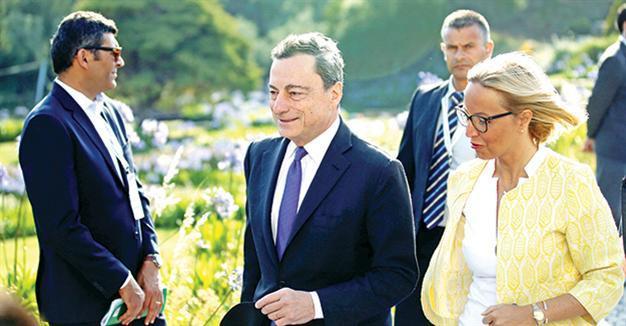ECB ‘to pave way for stimulus in September’
FRANKFURT-Agence France-Presse

REUTERS photo
The European Central Bank, widely expected to hold fire on monetary policy this week, will likely prepare the ground for more stimulus measures in September as the economic fallout for the eurozone from Brexit becomes clearer, analysts predicted.The ECB’s decision-making governing council is scheduled to hold its regular policy meeting this week, a month after Britain voted to quit the European Union.
While the initial market turmoil triggered by the shock outcome has abated, taking the heat off the ECB and other major central banks to charge to the rescue immediately, observers believe the true extent of the economic damage will only become discernible later.
Britain’s new prime minister Theresa May has yet to decide when to trigger Article 50 of the Lisbon Treaty, formally notifying Brussels of Britain’s exit and starting a two-year countdown on divorce from the EU. The full economic consequences of Brexit are only likely to become clear during the negotiations on the terms of its exit. The Bank of England already held fire on an interest rate cut last week, although it flagged it will likely act at its next meeting in August.
The ECB is similarly likely to bide its time, analysts said.
“No further measures are expected at the meeting as the ECB was reported to be relieved about the markets’ rather muted reaction to the Brexit vote,” said Commerzbank economist Michael Schubert.
“A monetary reaction appears unlikely to be considered by the council before September,” the expert said.
So far this year, in a bid to kick-start recovery and drive inflation rates up to levels more compatible with healthy economic growth, the ECB has cut its main refinancing rate to zero, beefed up its asset purchase program known as quantitative easing (QE) and launched a new scheme of ultra-cheap loans to banks.
But eurozone inflation stood at just 0.1 percent in June, a long way off the ECB’s target of close to but just under 2.0 percent.
“But the Brexit vote has increased what were already significant downside risks to the eurozone economy and the inflation outlook remains dismal,” said Capital Economics economist Jennifer McKeown.
“We therefore expect the ECB to at least pave the way for more policy support in September, probably involving an interest rate cut and bigger asset purchases.”
“In the post-Brexit vote world, even though financial markets have calmed somewhat in recent days, the ECB’s concerns have increased,” said ING DiBa economist Carsten Brzeski.
“The economic recovery of the eurozone is again at risk, inflation could be lower and, above all, the future of the entire eurozone has never been shakier and more unclear than at present.”
The ECB is scheduled to publish its latest updated economic projections in September and those could give governing council members a better handle on what path to take.
Ben May at Oxford Economics said he was certain “there will be a contingent who, if conditions do worsen, will be open to more policy action.”
Nevertheless, even if the ECB does move again in September, analysts were divided about the effectiveness of further rate cuts with borrowing costs already at all-time lows.
One of the ECB’s key interest rates, the deposit rate, is already in negative territory, meaning eurozone banks pay to park their cash overnight at the central bank.
And taking it even lower could hurt banks’ profitability even more.
Another potential headache for the ECB is the current drop in bond yields as investors flee to ultra-safe investments to escape the uncertainties of falling stock markets or volatile commodities and currencies.
Fears are rife on the financial markets that Italy could also spark a new eurozone crisis if it does not address the 360 billion euros ($400 billion) in bad debt sitting in its national banks.
Markets have turned sour on several Italian banks, most notably Italy’s number-three lender and the world’s oldest bank, Banca Monte Paschi.
















